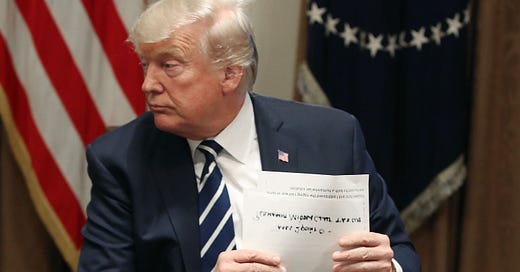Jack Smith’s Real Focus in the Mar-a-Lago Case
Plus: The war in Israel is a reminder of the danger of Trump’s sieve-like leaking of national security secrets.

ON OCTOBER 9, SPECIAL COUNSEL JACK SMITH filed a brief opposing Donald Trump’s motion to move the trial date in the Mar-a-Lago classified documents case—currently set for May 20, 2024—to seven months later, “shortly after the November 2024 election.”
Trump’s lawyer Christopher Kise made a bunch of arguments to justify the delay, primarily related to the Classified Information Procedures Act (CIPA). (Kise, it is worth noting, was one of several lawyers recently slapped with monetary sanctions for making bogus arguments in the civil fraud case pending before Judge Engoron in Manhattan.)
What’s most interesting about this exchange, however, is Smith’s statement that whether “classified materials . . . were taken from the White House and retained at Mar-a-Lago is not in dispute.”
If that’s not what the Mar-a-Lago case is about, then what is it about?
Here’s Smith: “What is in dispute is how that occurred, why it occurred, what Trump knew, and what Trump intended in retaining them.” Let’s say that again. According to Jack Smith, what’s important about the Mar-a-Lago case is not the fact that Trump took classified documents, but instead:
“how that occurred”
“why it occurred”
“what Trump knew” and
“what Trump intended in retaining them.”
Smith is understandably focused on whether—and how much—Trump harmed the national security of the United States. It’s an increasingly urgent question. To understand why, let’s start by looking at the law Kise cited in arguing for a delay.
CIPA applies when a criminal defendant claims a need to disclose classified information in connection with his or her prosecution. In that event, the government faces a choice between harming national security by allowing for the disclosure of the information or dropping the charges. CIPA was enacted to combat this problem, which is known as “graymail.”
In the Mar-a-Lago case, Smith wrote, “Trump is of course entitled to classified discovery in order to test or challenge the Government’s proof of the elemental allegation in the indictment that the documents he retained at the Mar-a-Lago Club contained national defense information.” U.S. District Judge Aileen Cannon, who is presiding over the case in Florida federal court, accordingly issued a 16-page protective order in September outlining “the procedures that must be followed by Defendant, defense counsel, the parties, and all other individuals who receive access to classified information or documents in connection with this case.”
Does anyone seriously doubt that Trump took classified information—and lots of it? We’ve all seen the photos from the indictment of file folders plastered with the words, “CLASSIFIED.” The FBI’s August 8, 2022, search of the property reportedly produced 11,000 government documents, including:
3 documents marked confidential
17 documents marked secret
7 documents marked top secret
43 empty folders with classified banners
28 empty folders labelled “Return to staff secretary/military aide”
Take that in: 71 folders marked classified or “return” that were empty. Where did the contents of those folders go?
And let’s not forget, as well, that the photos showed heaps of disheveled file boxes stacked on top of each other—some spilled all over the floor—in a bathroom, on a ballroom stage, and in a storage room that also happened to have a photocopy machine in the same room. Trump stashed more federal records in his home office at Mar-a-Lago.
The New York Times helpfully created a 3-D visual tour of the 20,000 acre-property, highlighting the rooms containing the classified information and the path taken by employees—at Trump’s direction—when moving the documents, allegedly to evade FBI scrutiny. One room containing boxes with documents is located right off of the pool area. Photos taken during parties held around the pool show the doors to that room swung open, presumably allowing access by random guests. Visitors can roam freely into the ballroom, as well. Trump held approximately fifty political events at Mar-a-Lago in the first nineteen months after he left office. Although most Mar-a-Lago events are invitation-only, some were open to the public, including a three-day vintage car show that sold 800 tickets.
In order to secure convictions on the over three dozen criminal counts set forth in the federal indictment, including more than thirty alleged violations of the Espionage Act, Smith’s team must prove a number of things, including the “gathering, transmitting or losing” of “national defense information,” and “willful” retention of such materials.
The law also criminalizes “knowingly and willfully” disclosing national defense information to “an unauthorized person.” Lower courts have held that to qualify as national defense information, it must be “closely held” and “potentially damaging to the United States” if disclosed.
EVEN IF LEGAL PRECEDENT didn’t require Smith to prove that what Trump did actually damaged the national security interests of the United States, he would likely have to make that showing in order to persuade a jury that this particular Trumpian tale of irresponsibility and recklessness deserves more than a disgusted shrug. Trump’s legal and political defense teams routinely argue that “Trump being Trump” absolves him of any responsibility for transgressions that would kill others’ careers. Smith needs to persuade the jury that this episode is different.
Yet the implications of this story could be far more dire. One word comes to mind this week: Israel.
By now we all know about Trump’s propensity to show off by revealing secrets to people he should not. Just this month came the revelation that he apparently divulged secrets about American submarines with an Australian billionaire, who in turn told many other people. Another chilling allegation is the one cited in the Mar-a-Lago indictment: that Trump illegally took a classified plan for attacking Iran, which the then-chairman of the Joint Chiefs of Staff, Gen. Mark Milley, endorsed, and showed it to a writer and a publisher at his golf club in Bedminster, New Jersey, on July 21, 2021. An audio recording of the scene has been made public.
And recall that, according to reporting by the New York Times, Trump admitted in 2017 that he gave the Russians classified intelligence provided by Israel, notwithstanding concerns that Russia would give it to Iran:
Israel is one of the United States’ most important allies and runs one of the most active espionage networks in the Middle East. Mr. Trump’s boasting about some of Israel’s most sensitive information to the Russians could damage the relationship between the two countries and raises the possibility that the information could be passed to Iran, Russia’s close ally and Israel’s main threat in the region.
While Israel would not confirm that it sourced the information Trump passed on to Russian President Vladimir Putin, Trump tweeted that he had an “absolute right” to share it and bragged of a “very, very successful” meeting with the Russians. While he was president, Trump was probably right—it was within his power to declassify information. That doesn’t mean he should have.
Meanwhile, “last weekend’s attack on Israel by Hamas has brought renewed scrutiny of the armed Palestinian group’s longstanding relationship with Iran,” the New York Times recently reported, as well as “questions about whether the Gaza-based group could have pulled off such a sophisticated and devastating operation on its own.” The Wall Street Journal reports that senior Hamas officials say the attack received advance support and approval from Iran. And over the weekend, the Times additionally reported “chilling details of how Hamas, the militia that controls the Gaza strip, managed to surprise and outmaneuver the most powerful military in the Middle East last Saturday” using “meticulous planning and extraordinary awareness of Israel’s secrets and weaknesses.”
There’s no telling in this moment whether Trump’s admitted disclosure to Putin of Israeli secret intelligence in 2017 had any connection whatsoever to the heinous attack on Israel by Hamas last weekend. The thread nonetheless matters for the obvious reason that this man is the frontrunner for the Republican nomination for the presidency in 2024.
Smith is 100 percent correct that the pressing question in the Mar-a-Lago case is not whether Trump technically violated the Presidential Records Act and other laws by taking classified information from the Oval Office—but how much damage he did to U.S. interests and national security and what can be done about it now.
At the very least, if the trial date stays put, we might get some answers to these troubling questions—seven months from now.





